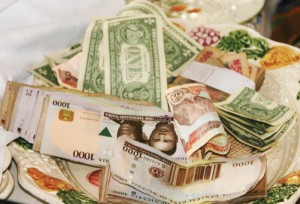Shortly after taking office as governor of the Central Bank of Nigeria, Sanusi Lamido Sanusi was aghast when he discovered the degree of rot in the banking sector. In the end, the apex bank had to pump about two trillion naira of public funds to rescue the most troubled banks. Eventually, some bank CEOs were forced to resign and indicted. The biggest names were Oceanic Bank’s Cecelia Ibru, Intercontinental Bank’s Erastus Akingbola and PHB’s Francis Atuche.
In the end, only Ibru was convicted and given a six month ‘bed rest’ (well deserved, considering the monumental effort it must have taken to steal N191 billion), which she was forced to return. After returning from the UK where he had fled to avoid arrest, Akingbola went on trial and was promptly freed by a Lagos court. Like James Ibori, it took a high court sitting in London to order that Akingbola return the sum of N164 billion he allegedly stole. We all know that won’t happen. Atuche is practically a free man, and may soon be discharged and acquitted as well.
In effect, not one person has been actually jailed for the trillions of naira they stole from Nigerian banks – not even the CBN governor at the time, Charles Soludo who must have known of the excesses.
Similarly, the story of the trillions of naira lost in the Nigerian stock market may never be completely told, but what happened was clearly a tale of unbridled greed. All the operators knew that there was no basis for the mind-boggling gains being made in the market, but lacked the capacity for restraint. It took an all-out war to fire NdidiOkereke who presided over the scam. Even today, many Nigerians feel the pain of the vast sums of money they lost. Or course, the cash didn’t t simply vanish; some people took it.
While the country was yet to fully recover from the grand theft in banks and the stock exchange, the story of even worse scams emerged from the oil sector, particularly in the oil subsidy regime and allocation of oil blocks. Indications are that fraudulent claims cost Nigeria N2.6 trillion. The Ribadu Panel, whose report has just been conveniently rubbished by the Presidency, also shows that Nigeria might have lost another N4.6 trillion to graft in the oil sector.
At the moment, a scam of epic proportions is going on in the telecoms sector. The whole picture of how Nigerians are being cheated by the telecommunications giants may also never be fully known or told because of our weak consumer protection culture in Nigeria and malleable regulatory institutions which have been unable to hold telecoms operators to account. It is clear to all users of GSM and Internet services in the country that the poor services and high costs means that regulatory agencies are either asleep or ‘settled’.
And just when you think that the private sector has overtaken the public sector in graft, you are given a sharp, violent reminder that the competition is very much on: which is why a few civil servants can steal billions of naira from pension funds and remain free; which is why a Supreme Court Justice could jump protocol to intervene in a matter not even before the Court; which is why a few defence and security officials collaborated with Israeli contractors to defraud Nigeria of a staggering N30bn; which is why the National Assembly is akin to a souk or a money market.
But repeating these truths is like flogging a long dead horse. The real story is that those who committed these ‘crimes against’ humanity are not only free to go about enjoying their plunder, but remain part of the political and economic elite, close to (or within the corridors of power) and able to dictate or influence public policy. The more blatant the theft, the more powerful they become. It is no surprise that the Senate remains an attractive magnet for many indicted former state governors and public officials.
Incidentally, there is a mistaken notion that only the president, the vice president and state governors have immunity from prosecution in Nigeria. But how many traditional rulers also have permanent immunity: recall the former boss of a uniformed agency who was facing graft charges? He quickly bought himself a first class traditional title though he had no connection to ruling families whatsoever. He is a ‘royal father’ today.
The lessons seems to be that if you want to steal real money in Nigeria, simply borrow money to establish a bank, then immediately steal every kobo of depositors funds as soon as it reaches your target. Or submit the name of a company (registered or not) to be paid billions of fuel subsidy funds (whether it imported fuel or not). Or just have your friends in power issue oil blocks for practically free.
Most importantly, have an Otedola or Orosanye on standby to compromise any person or rubbish any report that would tell us how a combined N7.2 trillion was stolen in the oil sector alone.
